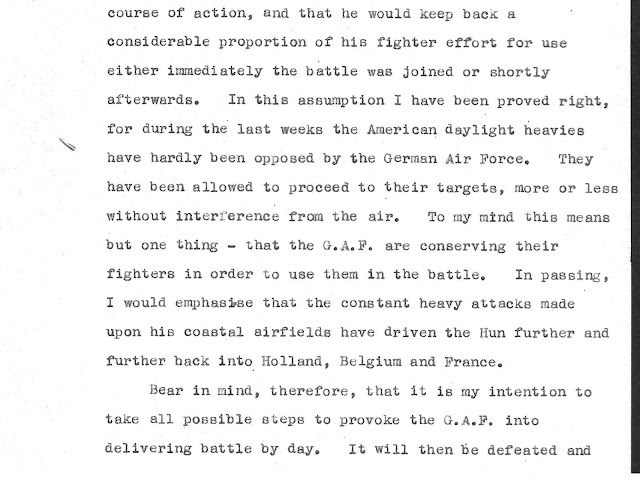Air Chief Marshal Sir Trafford Leigh-Mallory is one of those senior officers that historians love to hate. His poor reputation is primarily based on his activities during the Battle of Britain and, subsequently, his command of 11 Group, Fighter Command. He nevertheless became Air Officer Commander-in-Chief of Fighter Command in 1942.
In December 1943, the Allies finalised their joint command and control structure for Operation Overlord. Eisenhower was appointed Supreme Allied Commander. His deputy, Air Chief Marshal Tedder, had acted as Eisenhower’s deputy and air commander in the Mediterranean. Beneath them were the component commanders. Montgomery was placed in command of land forces, while Ramsay became the Maritime Commander. The role of Air Commander went to Leigh-Mallory.
Where the air forces were concerned, this was not a satisfactory arrangement. It arose because it was necessary (for planning purposes) for the Allies to appoint an air commander before Tedder returned to Britain from the Mediterranean. The Allies should simply have appointed a temporary air commander, who would have been relieved of his post as soon as Tedder became available. Instead, however, Leigh-Mallory continued to occupy his position and Tedder effectively became Supreme Commander for all air-related issues. It was often unclear where his authority ceased and Leigh-Mallory’s began.
To make matters worse, Leigh-Mallory did not secure control of all air assets assigned to Overlord. The Americans disliked him intensely and were reluctant to allow their strategic bombing force (the Eighth Air Force) to be subordinated to British command. Ultimately, then, both Allied strategic bombing forces (the Eighth Air Force and RAF Bomber Command) were placed under Tedder’s direction on the strict understanding that he was acting on Eisenhower’s behalf.[2] Unity of command is one of the fundamental principles of warfare. For the Allied air forces committed to the Normandy campaign, it was not achieved.
Air Chief Marshal Leigh-Mallory’s formal title was Air Commander-in-Chief, Allied Expeditionary Air Force (AEAF). The forces at his disposal were the United States Army Air Force (USAAF) and the RAF air defence, ground-attack, tactical reconnaissance and air transport formations. He could act as advisor and co-ordinator for the strategic air forces, but not as their commander. His position was unenviable in the extreme: he was placed in charge of one of the largest and most complex air operations ever to be mounted but denied the authority he needed to exercise his command. Consequently, despite his historical unpopularity, he deserves at least some admiration and credit for the success of Allied air operations before and during the Normandy campaign.
For much of the campaign, Leigh-Mallory dictated a daily diary, parts of which are reproduced here. Inevitably, it demonstrates that he was right on some issues and wrong on others. More importantly, however, it captures the perspective of a senior Allied air officer at the time - a perspective often misunderstood or misrepresented in subsequent history.
To make matters worse, Leigh-Mallory did not secure control of all air assets assigned to Overlord. The Americans disliked him intensely and were reluctant to allow their strategic bombing force (the Eighth Air Force) to be subordinated to British command. Ultimately, then, both Allied strategic bombing forces (the Eighth Air Force and RAF Bomber Command) were placed under Tedder’s direction on the strict understanding that he was acting on Eisenhower’s behalf.[2] Unity of command is one of the fundamental principles of warfare. For the Allied air forces committed to the Normandy campaign, it was not achieved.
Air Chief Marshal Leigh-Mallory’s formal title was Air Commander-in-Chief, Allied Expeditionary Air Force (AEAF). The forces at his disposal were the United States Army Air Force (USAAF) and the RAF air defence, ground-attack, tactical reconnaissance and air transport formations. He could act as advisor and co-ordinator for the strategic air forces, but not as their commander. His position was unenviable in the extreme: he was placed in charge of one of the largest and most complex air operations ever to be mounted but denied the authority he needed to exercise his command. Consequently, despite his historical unpopularity, he deserves at least some admiration and credit for the success of Allied air operations before and during the Normandy campaign.
For much of the campaign, Leigh-Mallory dictated a daily diary, parts of which are reproduced here. Inevitably, it demonstrates that he was right on some issues and wrong on others. More importantly, however, it captures the perspective of a senior Allied air officer at the time - a perspective often misunderstood or misrepresented in subsequent history.
5 June 1944
7 June 1944
8 June 1944
9 June 1944
10 June 1944
11 June 1944
12 June 1944
13 June 1944
14 June 1944
15 June 1944
16 June 1944

17 June 1944
18 June 1944
19 June 1944
20 June 1944
21 June 1944
22 June 1944
23-24 June 1944
25-26 June 1944

27 June 1944
28 June 1944
29 June 1944
30 June 1944
2 July 1944
3 July 1944
4 July 1944
5 July 1944
6-7 July 1944
8-10 July 1944
11-12 July 1944
13 July 1944
14-15 July 1944
16 July 1944
17 July 1944
18-19 July 1944
20-21 July 1944
22-25 July 1944
26-27 July 1944
28 July 1944
29-31 July 1944
1 August 1944
4-6 August 1944
7-9 August 1944
10-11 August 1944
12-14 August 1944
15 August 1944











































































































































































No comments:
Post a Comment